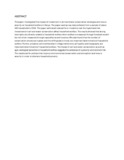| dc.contributor.author | Mariara, Jane W | |
| dc.contributor.author | Linderhof, Vincent | |
| dc.contributor.author | Germano, Mwabu | |
| dc.date.accessioned | 2013-04-19T13:05:36Z | |
| dc.date.issued | 2010 | |
| dc.identifier.citation | Journal of Development and Agricultural Economics Vol. 2(2) pp.041–053, February 2010 © 2010 Academic Journals | en |
| dc.identifier.uri | http://erepository.uonbi.ac.ke:8080/xmlui/handle/123456789/16423 | |
| dc.description.abstract | This paper investigated the impact of investment in soil and water conservation strategies and tenure security on household welfare in Kenya. The paper used survey data collected from a sample of about 450 households in 2004. The paper estimated reduced form models to test the hypothesis that investments in soil and water conservation affect household welfare. The results showed that strong land rights are directly related to household welfare when welfare is measured through livestock wealth but not when measured through expenditures and incomes. We also found that the number of conservation structures in place and the willingness to invest are important determinants of household welfare. Further, presence and membership in village institutions, soil quality and topography are important determinants of household welfare. The impact of soil and water conservation as well as agro-ecological potential on household welfare suggests the existence of a poverty-environment link. The results call for policies that improve environmental conservation and strengthen land tenure security in order to alleviate household poverty. | en |
| dc.language.iso | en | en |
| dc.subject | Poverty-environmental links | en |
| dc.subject | soil and water conservation and tenure security on household welfare in Kenya | en |
| dc.title | Poverty-environmental links: The impact of soil and water conservation and tenure security on household welfare in Kenya | en |
| dc.type | Article | en |
| local.publisher | School of Economics | en |

